Daily Vocabulary Words: List of Daily Used Words
Hi there. Welcome to this special section @ Wordpandit.
Our endeavour here is straightforward: highlighting important daily vocabulary words, you would encounter in The Hindu. This is your repository of commonly used words; essentially, we are posting a list of daily used words. Hence, this has significant practical application as it teaches you words that are commonly used in a leading publication such as The Hindu.
Visit the website daily to learn words from The Hindu.
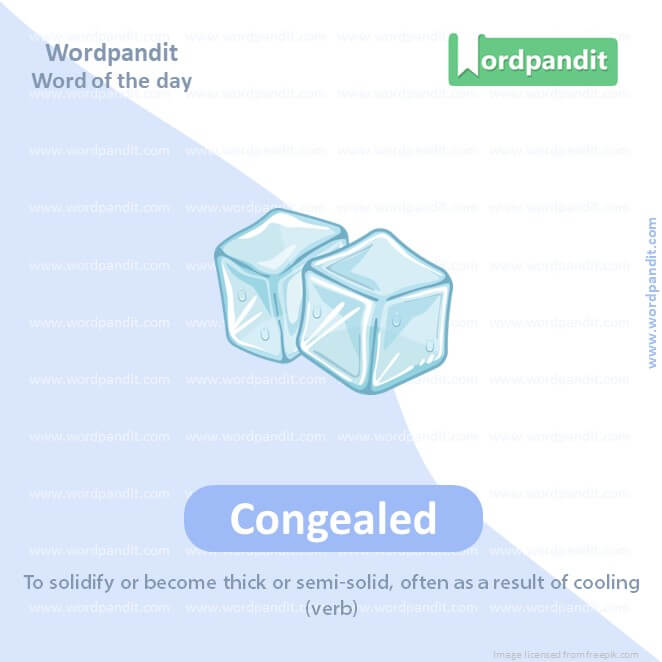
WORD-1: Congealed
CONTEXT: It is common knowledge that power in all political parties has congealed in the hands of a few individuals.
SOURCE: The Hindu
EXPLANATORY PARAGRAPH: Imagine you have a bowl of liquid soup. If you leave it in a cold place for a while, the soup might turn thick and almost solid. That’s what happens when something congeals. It changes from being liquid to being thick or semi-solid, like jelly.
MEANING: To solidify or become thick or semi-solid, often as a result of cooling (verb).
PRONUNCIATION: kuhn-jeeld
SYNONYMS: Solidified, Thickened, Coagulated, Clotted, Gelatinized, Hardened.
USAGE EXAMPLES:
1. The blood had congealed into clots.
2. The gravy will congeal as it cools.
3. The cold air caused the oil to congeal.
4. Jelly congeals as it sets.
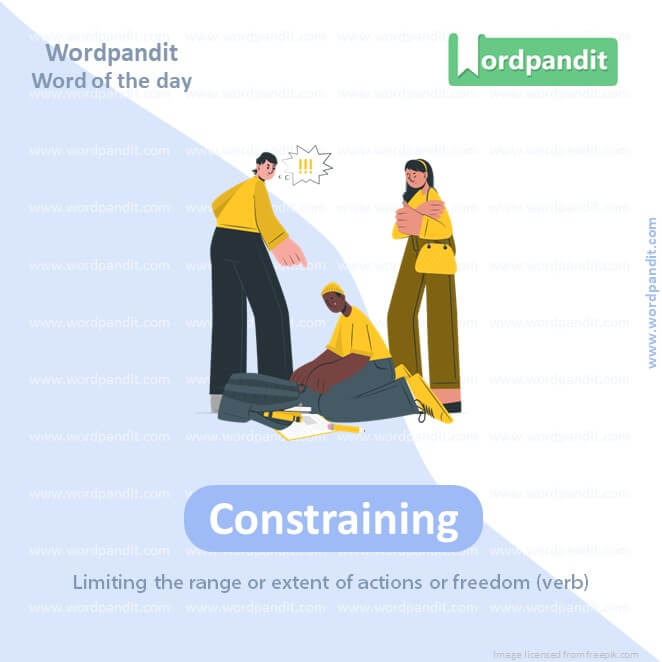
WORD-2: Constraining
CONTEXT: Much has been written about how the anti-defection law subverts representative democracy by constraining legislators to party leadership’s diktat.
SOURCE: The Hindu
EXPLANATORY PARAGRAPH: Think of when you want to run around but you have to stay in your chair. That feeling of being held back or not being able to do what you want is like being constrained. It’s like having invisible ropes around you, making you stay put or do something a certain way.
MEANING: Limiting the range or extent of actions or freedom (verb).
PRONUNCIATION: kuhn-stray-ning
SYNONYMS: Restricting, Limiting, Confining, Binding, Inhibiting, Controlling.
USAGE EXAMPLES:
1. The rules were constraining their creativity.
2. She felt constrained by her family’s expectations.
3. Budget limits are constraining the project’s progress.
4. The tight dress was constraining her movements.
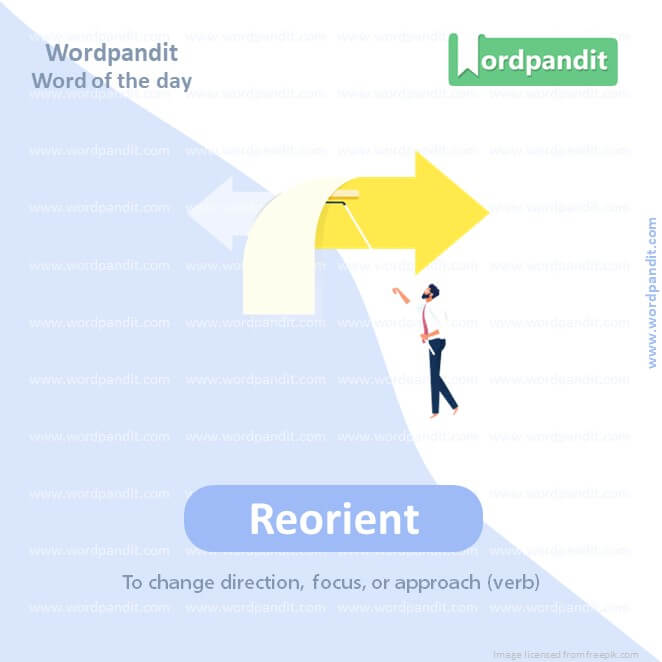
WORD-3: Reorient
CONTEXT: Party members must use their influence to restrain their own party’s excesses and reorient focus towards substantive issues.
SOURCE: The Hindu
EXPLANATORY PARAGRAPH: Imagine you’re walking in one direction, and then you decide to turn and walk in a different direction. Reorienting is like that. It’s changing the direction you’re going or the way you’re thinking about something. Like deciding to draw a cat instead of a dog.
MEANING: To change direction, focus, or approach (verb).
PRONUNCIATION: ree-awr-ee-ent
SYNONYMS: Redirect, Reposition, Adjust, Realign, Refocus, Recalibrate.
USAGE EXAMPLES:
1. He had to reorient his career goals.
2. The compass helped them reorient in the forest.
3. The company reoriented its marketing strategy.
4. She reoriented the furniture to maximize space.
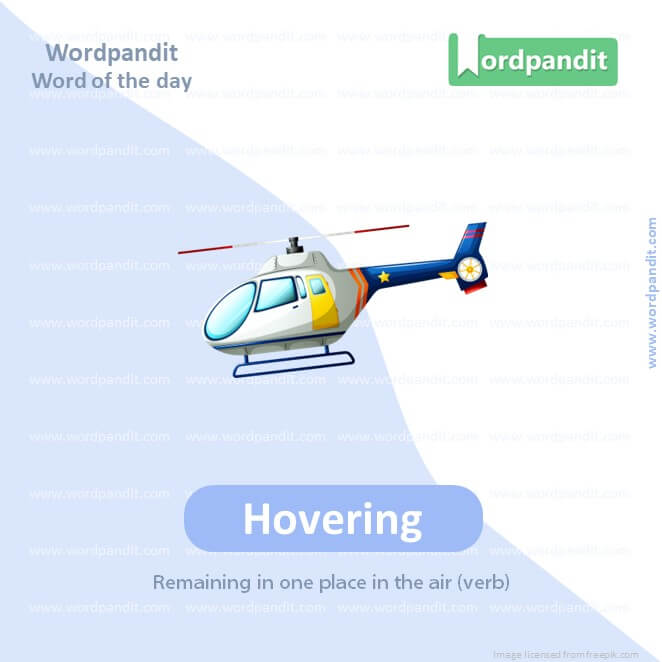
WORD-4: Hovering
CONTEXT: It is never an ideal long-term strategy. Rohit, Virat Kohli, R. Ashwin and R. Jadeja, are all hovering around the mid to late thirties mark, and their gradual walk towards the twilight seems inevitable.
SOURCE: The Hindu
EXPLANATORY PARAGRAPH: Think about a bird flying in one place in the sky without moving forward or backward. It’s like the bird is hanging in the air. That’s hovering. You can hover with your finger over a button without pressing it, just keeping it close.
MEANING: Remaining in one place in the air (verb).
PRONUNCIATION: huhv-er-ing
SYNONYMS: Floating, Drifting, Gliding, Flitting, Lingering, Suspended.
USAGE EXAMPLES:
1. The helicopter was hovering above the building.
2. He kept hovering around the kitchen, waiting for dinner.
3. The drone hovered in the air, capturing photos.
4. Birds were hovering over the water.
WORD-5: Antagonism
CONTEXT: The erosion of good faith in our politics has led to a mindless zero-sum antagonism, where only the most partisan, rather than those driven by public interest, can thrive.
SOURCE: The Hindu
EXPLANATORY PARAGRAPH: When two people or things are really against each other and don’t get along, like when you don’t want to share your toys with your sibling, that’s antagonism. It’s a strong feeling of not liking someone or something and often wanting to oppose them.
MEANING: Strong opposition or hostility between people or things (noun).
PRONUNCIATION: an-tag-uh-niz-uhm
SYNONYMS: Hostility, Opposition, Rivalry, Conflict, Enmity, Animosity.
USAGE EXAMPLES:
1. There was a sense of antagonism between the two teams.
2. His antagonism towards his rival was obvious.
3. Antagonism between the siblings grew over time.
4. The debate was marked by deep antagonism.
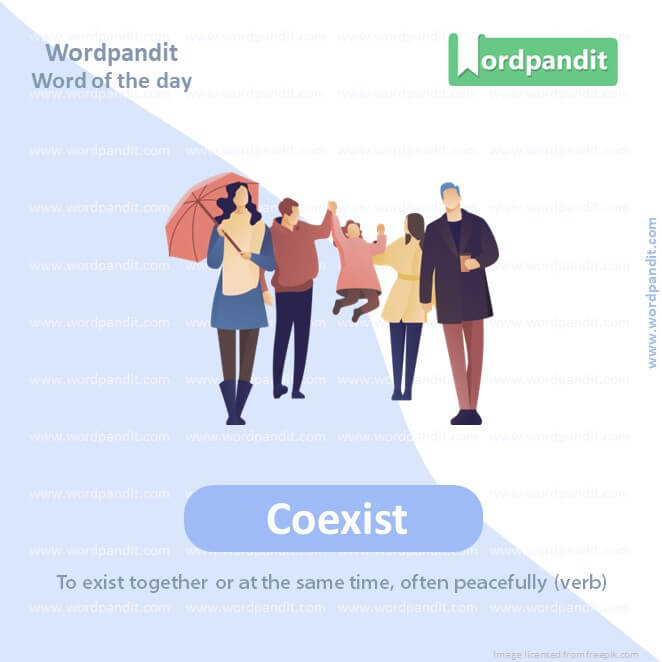
WORD-6: Coexist
CONTEXT: A fundamental purpose of democracy is to establish processes to negotiate differences among a diverse population that must coexist.
SOURCE: The Hindu
EXPLANATORY PARAGRAPH: Imagine different kinds of animals living in the same forest without bothering each other. They are coexisting. That means they are living in the same place or time, getting along or at least not fighting or causing problems for each other.
MEANING: To exist together or at the same time, often peacefully (verb).
PRONUNCIATION: koh-ig-zist
SYNONYMS: Co-live, Share,
WORD-7: Spectacularly
CONTEXT: This strategy not only renders the Opposition complicit in the breakdown of communication but is also spectacularly ineffective in that it focuses the Opposition’s attention on tactics with limited electoral relevance.
SOURCE: The Hindu
EXPLANATORY PARAGRAPH: Imagine seeing the biggest, brightest fireworks you’ve ever seen. That’s spectacular. When something is done spectacularly, it’s done in a really amazing, impressive, or beautiful way that makes you say “wow!”
MEANING: In an impressive, beautiful, or dramatic way (adverb).
PRONUNCIATION: spek-tak-yuh-ler-lee
SYNONYMS: Impressively, Magnificently, Stunningly, Remarkably, Splendidly, Dazzlingly.
USAGE EXAMPLES:
1. The athlete performed spectacularly at the event.
2. The sunset was spectacularly beautiful.
3. She succeeded spectacularly in her new role.
4. The show ended spectacularly with fireworks.
WORD-8: Spontaneous
CONTEXT: It would be naive to expect a spontaneous change of heart from protagonists on both sides.
SOURCE: The Hindu
EXPLANATORY PARAGRAPH: Think about suddenly deciding to dance in the rain without planning it. That’s being spontaneous. It means doing something on the spur of the moment, without planning or thinking about it beforehand, just because you feel like it.
MEANING: Done without planning, arising naturally (adjective).
PRONUNCIATION: spon-tay-nee-uhs
SYNONYMS: Impulsive, Unplanned, Natural, Instinctive, Impromptu, Unpremeditated.
USAGE EXAMPLES:
1. He made a spontaneous decision to travel.
2. Her laughter was spontaneous and joyful.
3. A spontaneous gathering of friends occurred.
4. The reaction was spontaneous and heartfelt.
WORD-9: Indefensible
CONTEXT: First and foremost, while partisanship is an important driver of multi-party democracy, party membership is increasingly being construed as a tribal pledge to defend the indefensible.
SOURCE: The Hindu
EXPLANATORY PARAGRAPH: Imagine saying something wrong and not being able to find any good reason to explain why you said it. That’s indefensible. It means something is so wrong or bad that you can’t defend or justify it.
MEANING: Unable to be defended or justified, typically because it is morally wrong (adjective).
PRONUNCIATION: in-di-fen-suh-buhl
SYNONYMS: Unjustifiable, Inexcusable, Unpardonable, Unwarrantable, Irredeemable, Unsupportable.
USAGE EXAMPLES:
1. The decision was indefensible and unfair.
2. His behavior was completely indefensible.
3. The argument was indefensible on moral grounds.
4. That act was indefensible by any standards.
WORD-10: Belligerent
CONTEXT: The demands of unthinking and belligerent fealty can only exacerbate partisanship and cynicism.
SOURCE: The Hindu
EXPLANATORY PARAGRAPH: Imagine someone who always wants to fight or argue, like a character in a movie who’s always getting into trouble. That’s being belligerent. It’s when someone is very aggressive and ready to fight or argue.
MEANING: Showing a readiness to fight or argue, aggressive (adjective).
PRONUNCIATION: buh-lidj-uh-runt
SYNONYMS: Aggressive, Hostile, Combative, Quarrelsome, Warlike, Pugnacious.
USAGE EXAMPLES:
1. His belligerent attitude made him unpopular.
2. She took a belligerent stance in the debate.
3. The belligerent crowd started to shout.
4. He became belligerent after drinking too much.
Vocabulary new Words
In the exuberant realm of language learning, nothing holds more thrill than the discovery of ‘vocabulary new words’. These gems of knowledge bring with them a fresh perspective and a deeper understanding of language. However, learning ‘vocabulary new words’ requires a methodical and focused approach.
The act of learning ‘vocabulary new words’ is a delve into linguistic novelty, often involving exposure to unfamiliar structures and meanings. Transcending the traditional approach of mere memorization helps in truly cementing newly learnt words into long-term memory. Interaction with a broad spectrum of written and spoken material, including novels, films, podcasts, and digital resources, provides a rich context of ‘vocabulary new words’ and significantly aids in their comprehension.
It’s noteworthy that unpacking ‘vocabulary new words’ is a steady process rather than a rushed one. A planned approach with a specific number of words, learned and reviewed each day, proves beneficial in effective learning. Coupling this method with technologies such as flashcards or memory-enhancement software can optimize the retention of ‘vocabulary new words’.
Integrating mnemonic devices and visual imagery is another highly efficient tool when learning ‘vocabulary new words’. Assigning unique stories or visuals to new words can enhance recall, making unfamiliar vocabulary much more approachable.
Lastly, practicing ‘vocabulary new words’ within daily routine is crucial for grasping their usage. Whether it’s through active utilization in conversation or incorporating these words in written communicative situations, application reinforces understanding.
In summation, mastering ‘vocabulary new words’ is an enriching pursuit that expands our linguistic horizons. However, a balanced approach, combining diverse reading materials, pacing your learning, employing memory-boosting strategies, and daily practice greatly streamlines the task. Embark on this fascinating journey, and let the ‘vocabulary new words’ fill your linguistic canvas with a fresh palette of expressions.







